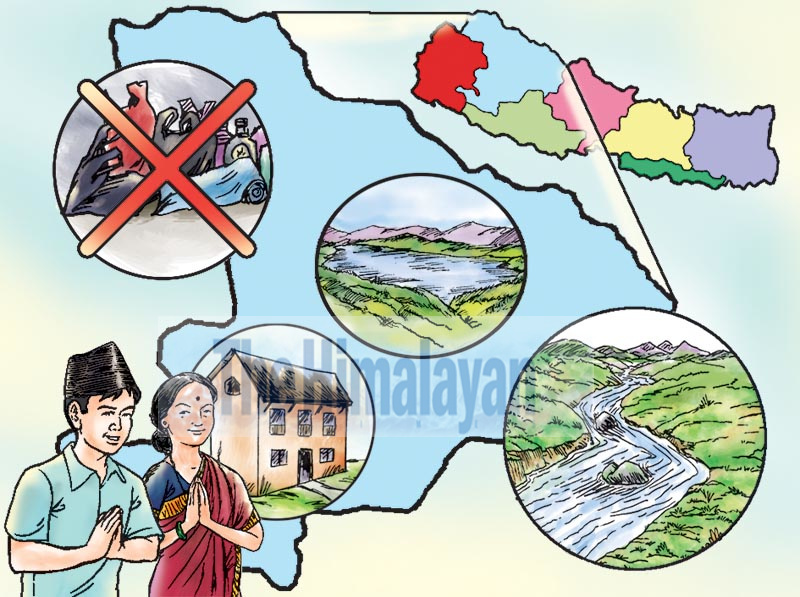Bewitching Karnali: Let’s not defile it
The government should intervene in the development and tourism aspects of Karnali Province rather than letting the private sector to set up business empires at the cost of its ecology and environment
My recent vacation tour of Rara Lake with my colleagues has compelled me to share my general reflection of Karnali Province in mid-west Nepal, which has long been touted by both national and local level politicians for its development potential when it comes to wooing their voters. Although we were able to fathom the beauty of only five of its 10 districts, that is, Surkhet, Dailekh, Kalikot, Jumla and Mugu, I could not stop but marvel at the whole province because nature seems to have poured its entire splendour on it.
Before getting to the lake, different sorts of thoughts about the lake and everything about Karnali crossed my mind. No mental image of a natural place could be as rewarding as the visualisation achieved in person.
After actually visiting a natural place or thing of some human engineering feat, we get to be a part of that place. We get to actually feel many aspects of the ambiance and natural environment there in different ways.
Such an experience can never be achieved vicariously, can it? For instance, it was not until this trip that I got to touch, tread and frolic in the snow. It was my first ever experience of seeing snow close-up. I got to “wallow” in the snow to my heart’s content.
Instead of signing up for a tour package to Rara Lake from Kathmandu, we chose to go on our own by a passenger bus to Surkhet. But we chose to reserve a jeep to our destination from Surkhet because the road leading there was treacherous, and a comfortable journey was best offered by a small reserved vehicle, such as a jeep or a van. Moreover, we were able to choose what and how we wanted to do different things on the way at the different stopovers.
We, a team of nine people, had agreed to make our journey as pleasant as possible on the one hand and economical on the other.
Therefore, our modus operandi of travelling to Rara was typical of the way a common Nepali would follow. Needless to say, travelling by plane is beyond the means of the common man of this country. On top of that, we were all guided by the belief that travelling is about getting out of our comfort zone to feel and get absorbed in the beauty of Mother Nature.
We knew travelling could be just the great opportunity to expand the horizon of our knowledge by knowing how the other half of the country lived.
This shared principle of ours would not have been supported and corroborated further if we had chosen to visit Rara through an expensive tour package involving plane tickets. We, in fact, wanted to relish our whole journey to Rara Lake all the way from Kathmandu, not only the lake itself.
After starting at around 7 in the morning from Surkhet, we had a nice stopover at Jumla the same day before reaching Rara Lake the next day at around 4 in the afternoon.
We stopped by the famous hot water spring of Jumla, called Tatopani, just before dusk and actually felt the natural hot water. I think the people there are lucky to have that perpetually running hot water stone spout in their neck of the woods.
The hotel at Jumla served us local Marsi rice upon our request, evoking the thought of the infamous viral picture of KP Oli and Prachanda dining with a businessman. The river valley civilisations along the Tila River and Hima River are the crowning glory of the province. I was mesmerised by the abundance of nature’s bounty like water, medicinal herbs and the like. It would have been foolish to spend money on bottled water and contribute to plastic pollution against the backdrop of the ubiquitous sights of water oozing out of the cliffs along the way.
Karnali Province undoubtedly has untold untapped potential for development. But it’s infuriating to find that dirty politics has begun to take its toll on its ecology and environment. Influx of internal tourists, especially during the autumn festivals, is considerably higher than in the other seasons.
Tales of misery and hardships of those visiting the place during this time of the year are aplenty. They complain that even basic accommodation, amenities and food are not available because of the monopoly of the two lakeside hotels. As always in the case of the public suffering in the hands of service providers, they easily pass the buck for their underperformance to the surging number of visitors.
We found the general people and people running small businesses all along the journey very naïve, friendly and considerably humble.
It was the big business people who seemed to have a callous attitude towards others and were trying to rip the travellers off.
The government should focus more on promoting homestays for the tourists rather than allowing new hotels and resorts to come up at the cost of the so-far unsullied Rara’s ambiance.
Homestays will directly benefit both visitors and the host families over and above contributing to swift and effective promotion of indigenous goods, cultures and traditions.
The government should intervene in the development and tourism aspects of Karnali Province rather than letting the private sector to set up business empires at the cost of its ecology and environment.
It is most disappointing to see plastic wrappers and bottles slowly making inroads on the pristine virgin lands. It will be a great mistake on the part of the government not to learn from elsewhere and be a party to the defilement of Karnali Province.






